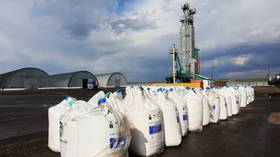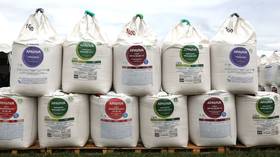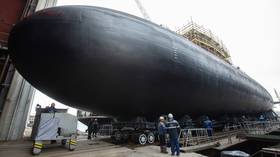German data reveals growing dependence on Russian fertilizers

Germany has boosted imports of nitrogen fertilizers from Russia during the past agricultural year despite Berlin’s repeatedly voiced intentions to distance itself from the sanctioned country, the Berliner Zeitung news outlet reported this week, citing calculations based on data from the Federal Statistical Office (Destatis).
According to the report, purchases of Russian fertilizers by German farmers have soared by roughly 334%, from 38.5 thousand tons in July 2022 to 167 thousand tons as of June 2023. Imports of urea alone increased by 304% in the first half of 2023 compared to the same period last year. As a result, Russia's share in the total volume of the country’s fertilizer imports surged from 5.6% to nearly 18%.
Germany’s domestic fertilizer output has been dwindling amid rising gas prices, which made production more expensive. While in the 2021-2022 agricultural year German companies produced 37% of the country’s total fertilizer consumption, last year they covered only 5%.
Heavily reliant on energy imports from Russia, Germany was among the hardest hit by the reduction in Russian gas deliveries, which dropped significantly last year after the EU imposed sanctions on Moscow in response to the conflict in Ukraine. Importing from alternate sources helped Germany lower energy prices, but only to a degree, and according to recent forecasts, prices are likely to remain elevated until at least 2027.
Martin May, spokesman for Germany’s Agricultural Industry Association, told Berliner Zeitung that buying Russian fertilizers is just another way for the country to import Russian gas.
“For Germany, it was a major effort last year to become independent from Russian gas supplies. Gas and energy make up 80-90% of the manufacturing costs of mineral fertilizers. That means that, ultimately, the imported fertilizers are nothing more than cheap Russian natural gas at the next value-added stage,” May said.
For more stories on economy & finance visit RT's business section












